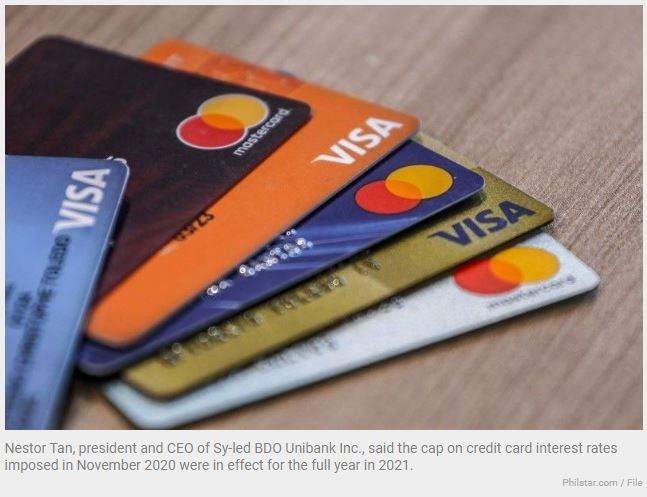Philippines: Cap on credit card charges impacts banks
MANILA, Philippines — The country’s largest banks continue to take a hit from the interest rate cap imposed by the Bangko Sentral ng Pilipinas (BSP) on credit card charges for more than a year.
Nestor Tan, president and CEO of Sy-led BDO Unibank Inc., said the cap on credit card interest rates imposed in November 2020 were in effect for the full year in 2021.
“Asset yields declined given low interest rates and excess liquidity in the system plus the implementation of the cap on credit card rates, which became effective November 2020,” Tan said.
BDO’s net interest income slightly dipped by two percent to P131.3 billion in 2021 amid yield compression brought about by excess market liquidity and the BSP’s cap on credit card rates.
The listed bank reported a 6.2 percent expansion in its loan book to P2.4 trillion in 2021 from P2.26 trillion in 2020.
This was faster than the five percent growth recorded by the banking sector as COVID mobility restrictions and quarantine protocols were eased.
East West Banking Corp. president and CEO Antonio Moncupa Jr. said the Gotianun-led bank has been adversely affected by the regulation on the cap on credit card interest rates.
“Our bank was also adversely affected by the regulation that put a cap on card interest rates. This meant for us a P2.6-billion reduction in gross interest income and largely accounted for about 50 percent of the total decline in net interest income,” Moncupa said.
Moncupa said the listed bank reported a 5.7 percent decline in credit card receivables to P33 billion in 2021 from P35 billion in 2020.
The STAR earlier reported that the regulator was imposing a two percent per month and 24 percent per year interest rate or finance charge cap on unpaid credit card balance.
The BSP formalized the imposition of the ceiling approved by the Monetary Board through Circular 1098 issued in late September last year. The cap took effect on Nov. 3, 2021.
Likewise, the monthly add-on rates that credit card issuers could charge on installment loans was limited to a maximum rate of one percent, as well as the maximum P200 per transaction processing fee on the availment of credit card cash advances.
The move helped ease the burden of Filipino consumers as the country continues to recover from the impact of the pandemic.
BSP Governor Benjamin Diokno earlier said the decision of the Monetary Board to retain the existing ceiling is in line with the current low interest rate environment in the country.
“The decision of the Monetary Board is based on a holistic assessment considering the developments in the macro economy, the state of credit card financing as well as the safety and soundness of banks and other credit card issuers. It will also continue to help ease the financial burden of consumers through affordable credit card pricing,” he said.
The BSP has maintained an accommodative monetary policy stance by keeping interest rates at record lows for eight straight rate-setting meetings to help the economic recovery gain more traction.
The Monetary Board slashed interest rates by 200 basis points, including the surprise 25-basis-point cut in November last year, bringing the benchmark rate at an all-time low of two percent.
Source: https://www.philstar.com/business/2022/04/26/2176706/cap-credit-card-charges-impacts-banks


 English
English




